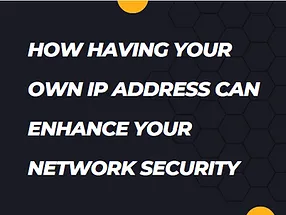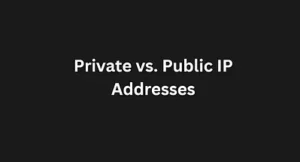While many telecommuters use VPNs or SSL certificates for secure remote work, it may not always be enough. This is when owning your IP address comes into play: an extra level of security that gives you greater control of the future of your business.
In this post, we’ll discuss how having your own IP address can enhance your network security. First, we’ll discuss basic IP addressing concepts to build up a clearer picture of how having your own IP address can enhance your network security.
What is an IP Address
An internet protocol (IP) address is used to identify individual computers, servers, domains (such as websites), or devices over the Internet. An IP address is also used within a local network — interconnected devices within your home or office. It serves as the address through which your computer communicates when accessing websites.
How IP Addresses Work
Your computer uses an IP address whenever it communicates over the Internet. When connecting your device to the internet, it must join a network, typically your Internet Service Provider (ISP) at home or public Wi-Fi when outside. The ISP assigns your device a temporary IP address, which changes when you disconnect or switch to another network, like hotel or coffee shop Wi-Fi.
Different Types of IP Addresses
There are various types of IP addresses. For this post, we’ll focus on two: consumer IP addresses and website IP addresses. Devices that connect to the Internet or interact with each other use consumer IP addresses.
On the other hand, your online business (whether it’s a website or an app) uses a website IP address.
The IP address you are using can be private or public. Private IP addresses are used within a network, such as when your wireless printer connects with your laptop. On the other hand, public IP addresses are used when you connect externally — whenever you connect to a device outside your home or office, you’ll use a public IP address. A public IP address is automatically assigned by their Internet service provider. Some businesses choose to invest in dedicated IP addresses so that they don’t need to share an IP address with anybody.
How Sharing IP Addresses Work
When you use a public IP address, you’re likely using a dynamic IP address. These addresses change periodically: you get whatever available address there is when you connect to the Internet. When you go offline, the IP address that your device used gets reassigned to another device.
This same principle applies to your website. If you don’t have your own IP address, your hosting provider will assign any available IP address they have on their server. If you pay for a dedicated IP address, you will get an IP address that is exclusively yours.
But this is where most discussions stop. Not many people discuss the ownership of an IP address. Even if you pay for an IP address, it is still technically not yours. For example: even if you purchase an IP address, you don’t have the freedom to transfer it.
Here’s another example from ARIN: If a business closes down, they need to inform ARIN so that ARIN can get the IP addresses assigned to the business. There needs to be a better discussion on ownership.
How having your own IP address can enhance your network security
1. Business continuity. People think of security in terms of hacking and malicious attack. But there’s another type of security you need: The security to continue doing business and having the freedom to grow it. Much of that is tied to IP address ownership.
Is there a guarantee that you can keep the IP address you are using? At present, there is none. A governing body technically has the power to take away your IP address or refuse to assign you one. There is no law or policy that will protect you from such actions.
2. Secure Remote Access: Having exclusive control over your IP address means that your employees can securely connect to company resources. Your business will have better control over access to sensitive data and trade secrets.
3. Lower Chance of IP Blacklisting: Imagine that your website is re-assigned an IP address that has been used for spamming or unethical activities. This puts your IP address at risk of being blacklisted even if you have nothing to do with any malicious activity.
4. Faster and Safer File Transfer: A dedicated IP ensures faster site speeds and allows you to create a private FTP server for secure and speedy file transfers within your organization.
5. Improved Email Deliverability: If you send a large volume of emails, a dedicated IP enhances email deliverability, as email services trust dedicated IPs more than shared ones.
6. Direct Access to Your Website: With a dedicated IP address, you can access your website directly using the IP, useful when domain servers are down.
7. IPv4 Scarcity: The pool of IPv4s in the world has long dried up. There’s only transfers of ownership that make it possible to acquire IPv4 addresses. You’re going to need secure ownership of your IPv4.
Conclusion
If you want to enhance your cybersecurity and ensure continuity of your business, you need to fight for the right to own your IP assets. You are not alone. NRS, along with many of its members, continue to fight for an Internet for all.
Join us in the fight to give people the power an




